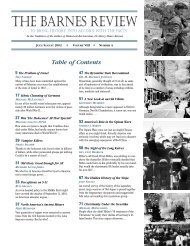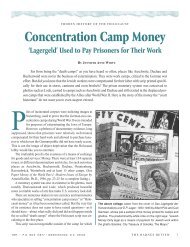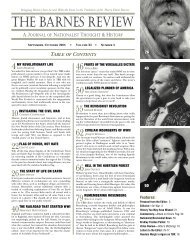Table of Contents - The Barnes Review
Table of Contents - The Barnes Review
Table of Contents - The Barnes Review
You also want an ePaper? Increase the reach of your titles
YUMPU automatically turns print PDFs into web optimized ePapers that Google loves.
action declared and entered into by Congress? Are we comfortable<br />
allowing one man so much power over the lives <strong>of</strong> so many people?<br />
3) A just war must be engaged in with the right intention. So,<br />
not only must the cause be just, but the disposition <strong>of</strong> the warriors<br />
on the side <strong>of</strong> justice must be honorable. Prolonged periods <strong>of</strong> denigration<br />
<strong>of</strong> the enemy and his culture do not produce a spirit <strong>of</strong> “right<br />
intention.” Instead, they produce a spirit <strong>of</strong> hatred, vengeance and<br />
pseudo-righteous wrath.<br />
4) <strong>The</strong>re must be proportionality between the evils <strong>of</strong> war and<br />
the good to be attained. That is, the evil that the war intends to correct<br />
must be greater than the evil the war itself will unleash. I<br />
remember seeing a picture <strong>of</strong> an Iraqi father grieving over the<br />
death <strong>of</strong> six family members, including several <strong>of</strong> his children.<br />
Questions <strong>of</strong> proportionality need to be asked before bombs are<br />
dropped on civilian centers.<br />
5) Every avenue <strong>of</strong> peaceful resolution must be explored<br />
before entering into hostilities.<br />
6) <strong>The</strong>re must be a reasonable hope <strong>of</strong> success in countering<br />
evil.<br />
7) Just conduct in a just war demands that honorable combatants<br />
practice discrimination. 4 That is, only enemy combatants<br />
are to be targets for killing. Women, children, men who are in the<br />
civilian sector, and even enemy soldiers who are on leave or are<br />
injured or captive, are not to be targeted for killing. Needless to say,<br />
point number seven, discrimination, is a perpetually thorny issue in<br />
just war discussion. How can modern weapons <strong>of</strong> mass destruction,<br />
such as our own bombs dropped from airplanes, be considered discriminatory<br />
in any way? <strong>The</strong>y can’t be. Bombs do not distinguish<br />
between a soldier in uniform or a child on the playground. Modern<br />
technology threatens to render a rich 2,000-year legacy <strong>of</strong> Christian<br />
and western principles null and void.<br />
I would like to review some <strong>of</strong> the above discussion and provide<br />
some specific examples <strong>of</strong> just war issues. For a war to be just<br />
there must be a just cause. Remember, that involves the defense <strong>of</strong><br />
a nation, but even this issue can become complicated when the<br />
issue <strong>of</strong> preemptive action is introduced.<br />
Even if a war can be entered justly, or legitimately, the justness<br />
<strong>of</strong> the cause can be undermined if the war is not conducted<br />
justly. Thus we have issues <strong>of</strong> just conduct during<br />
the actual war. Just conduct includes providing safety for<br />
civilians, proper treatment <strong>of</strong> POWs, and the prohibition <strong>of</strong> mass<br />
destruction <strong>of</strong> people and property. Only when there is a just cause<br />
with just conduct can there be a just war with the ensuing hope <strong>of</strong><br />
a just and enduring peace.<br />
I would like to add that for a war to be just there must be some<br />
discernible moral benefit to the actual combatants, a benefit that<br />
coheres to the other principles <strong>of</strong> just war theory. In other words, a<br />
young man or woman asked to don uniform and rifle must have<br />
some personal benefit, moral in nature, as a promise for their<br />
involvement in the war. Thus, neither hazard pay, medals, promotion<br />
in rank, victory celebrations nor patriotic fervor qualify. Rather, such<br />
considerations must be: Is the soldier’s family free from a real,<br />
immediate threat? Is his or her life safer? <strong>The</strong> promise <strong>of</strong> moral benefit<br />
must be at least as great as the sacrifice <strong>of</strong> life to attain it.<br />
Adoption <strong>of</strong> this principle would challenge the battle cries <strong>of</strong> interventionists<br />
seeking to involve our youth in foreign wars. <strong>The</strong> actual<br />
moral benefit gained by the American soldier fallen or crippled in<br />
Europe, Panama, Korea, Vietnam, Somalia or Iraq would be hard to<br />
demonstrate. It would be equally difficult to determine the moral<br />
benefit to his wife or children who must now go on without him.<br />
16 N O V E M B E R / D E C E M B E R 2 0 0 3<br />
Sadly, there have been some flagrant departures from just<br />
war theory in our recent history. I’ll begin with the Civil War, also<br />
known as the War Between the States. One southern gentleman<br />
informed me that the real name <strong>of</strong> this conflict should be the War <strong>of</strong><br />
Northern Aggression. At least three departures from just war principles<br />
may be observed in this war, whatever name you may prefer<br />
to give it. One departure is the violation <strong>of</strong> southern women by<br />
Union troops. We may associate and dismiss the fear experienced by<br />
the young women in Gone with the Wind as Hollywood movie-making.<br />
But in fact the women in the defeated South did indeed suffer<br />
some degree <strong>of</strong> “spoils <strong>of</strong> war” status. In New Orleans the Union<br />
General Benjamin Butler issued an order that women <strong>of</strong> the city<br />
who insulted a Union <strong>of</strong>ficer or soldier would be regarded as prostitutes<br />
plying their trade and would be treated as such. This in effect<br />
amounted to a “right to rape” order. It was at least interpreted that<br />
way in Europe. <strong>The</strong> British prime minister wrote to the U.S. ambassador<br />
in London,<br />
I will venture to say that no example can be found in<br />
the history <strong>of</strong> civilized nations till the publication <strong>of</strong> this<br />
order <strong>of</strong> a general guilty in cold blood <strong>of</strong> so infamous an<br />
act as deliberately to hand over the female inhabitants <strong>of</strong><br />
a conquered city to the unbridled license <strong>of</strong> an unrestrained<br />
soldiery.<br />
He later said to the English Parliament, “Any Englishman<br />
must blush to think that such an act has been committed by one<br />
belonging to the Anglo-Saxon race.” <strong>The</strong> French minister in<br />
Washington likewise voiced his objections to Butler’s order. Butler<br />
was eventually removed from his command, not because <strong>of</strong> this<br />
objectionable order, but because he was caught confiscating foreign<br />
property. He was given the post <strong>of</strong> commissioner <strong>of</strong> prisoner-<strong>of</strong>-war<br />
exchanges. 5<br />
Asecond departure from just war principles is the abuse <strong>of</strong><br />
Confederate POWs in Union prison camps. Thanks to<br />
Hollywood we are familiar with Andersonville, a prison<br />
camp for Union soldiers deep in the South. <strong>The</strong> suffering<br />
there was real and extensive. What is questionable is if the South<br />
intended to maliciously mistreat these prisoners by depriving them<br />
<strong>of</strong> food and medicine. In 1864 the Confederacy was hard-pressed to<br />
feed itself. Union victories throughout the South included the<br />
destruction <strong>of</strong> farms and crops. Food was in short supply for southern<br />
civilians and soldiers, making it doubly difficult for the Confederacy<br />
to adequately feed enemy soldiers who had invaded their<br />
homeland. Additionally, Union blockades made it difficult for the<br />
South to transport food throughout her land. Yes, Union soldiers suffered,<br />
but the population <strong>of</strong> the South suffered along with them.<br />
Unfortunately, Hollywood has not found as much interest in<br />
Elmira, a prison camp in New York for captured Confederate soldiers.<br />
Elmira was built to house 5,000 men, yet by September 1,<br />
1864 the camp’s population was 9,480 prisoners. Overcrowding led<br />
to the contamination <strong>of</strong> water systems used by the prisoners for<br />
drinking. <strong>The</strong> POWs were also deprived <strong>of</strong> adequate amounts <strong>of</strong><br />
food. While the area around the prison camp boasted a bumper crop<br />
<strong>of</strong> fruit and vegetables in the fall <strong>of</strong> 1864, prisoners inside the camp<br />
were dying <strong>of</strong> starvation. In September 1864, 385 prisoners died.<strong>The</strong><br />
federal government had to purchase an additional two acres for burial<br />
space since the one-half acre previously allotted for burial was<br />
now full. A Union <strong>of</strong>ficer wrote to his wife, “<strong>The</strong> rebs are dying quite<br />
fast, from eight to 30 per day.” In October, when 276 Confederates
















